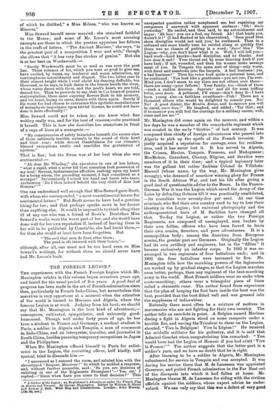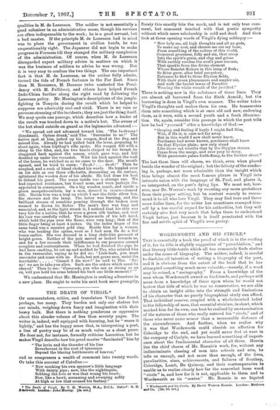THE FOREIGN LEGION.*
THE experiences with the French Foreign Legion which Mr. Manington relates in this volume began seventeen years ago, and lasted for the usual period of five years. A good deal of progress has been made in the art of French colonisation since then, particularly in French Indo-China, but nevertheless this narrative is very opportune at a moment when the attention of the world is turned to Morocco and Algeria, where the famous Legion is at work. Judging from his book, we should say that Mr. Manington is the best kind of adventurer,—
courageous, cultivated, sympathetic, and extremely good- humoured. Though well under forty years of age, he has been a student in France and Germany, a medical student in Paris, a soldier in Algeria and Tonquin, a man of commerce in Indo-China, and an interpreter, traveller, and journalist in South China, besides pursuing temporary occupations in Japan and the Philippines.
When Mr. Manington offered himself in Paris for enlist- ment in the Legion, the recruiting officer, half kindly, half cynical, tried to dissuade him :— "I uncovered as I entered the room, and saluted him with the stereotyped 'Bonjour, Monsieur ! ' to which he nodded a response,. and, without further preamble, said So you are desirous of enlisting in one of the Regiments gtrangers? '= Yes, sir,' I replied.—' Since when have you come to that decision ?' This
• A Soldier of the Legion: an Englishman's Adventuves wader the French Flag in Algeria and Tonquin. By George Manington. Edited by William B. Slater and Arthur J. Sari. With Map and Illustrations. London: John Murray. U00. ed, net.] unexpected question rather nonplussed me, but regaining my composure I answered with apparent coolness: 'Oh ! since yesterday.' He smiled, and then said, to my astonishment and anger: Rh biers! you are a fool, my friend. Ah! that hurts you, doesn't it ?' (I had flushed at his observation). 'Sure proof that stern discipline would not suit you,' he continued. Then in a softened and more kindly tone he rattled along so quickly that there was no chance of putting in a word: Satre bleu ! The Legion—why, you don't know what it is. Well, I will tell you— hard work—hard knocks—hard discipline, and no thanks. And how does it end? Your throat cut by some thieving Arab if you have luck ; if not, wounded, and then his women make sausage meat of you. In Tonquin the same sort of thing—only worse, 3vith fever and sunstroke into the bargain. A bad business ! yes, a bad business!' Then his voice took quite a paternal tone, and he continued: 'You look like a gentleman—you are one, I'm.sure. Mind you, I don't mean to say there are not others over there—
there are many—poor fellows ! Your family, too—think of them —such a sudden decision. Sapristi! and all for some trifling belise, sans doute. A petticoat, I'll swear—don't deny it—I have
been young also—a faithless sweetheart—Pish ! There are a thousand others who would be delighted to console you. -No.! No! A good dinner, the Moulin Rouge, and to-morrow you will be cured, score bleu ! ' He laughed, and added : 'Try that ; and if to-morrow you still feel the cravings for a military career, well, come and see me.' " Mr. Manington did come again on the morrow, and within a few days he was a member of the remarkable regiment which was created in the early " thirties " of last century. It was composed then chiefly of foreign adventurers who poured into Algeria to pick up the spoils of the French invasion. It justly acquired a reputation for courage, even for reckless- ness, and it has never lost it. It has served in Algeria, the Crimea, Mexico, Tonquin, Formosa, and Madagascar ; MacMahon, Canrobert, Chanzy, Negrier, and Serviere were members of it in their time; and a typical legionary later was the gallant but rather feckless Colonel de Villebois- Mareuil (whose name, by the way, Mr. Manington gives wrongly), who dreamed of somehow winning glory for France in the South African War, and lost his life after giving a good deal of questionable advice to the Boers. In the Franco-
German War it was the Legion which saved the Army of the Loire by defending Orleans till it was practically annihilated, —its casualties were seventy-five per cent. At one time criminals who fled their own country used to try to lose their
identity in the Legion ; but universal photography and the anthropometrical tests of M. Bertillon have changed all that. To-day the Legion, or rather the two Foreign Regiments, are composed of unemployed, men broken by their own follies, officers who have been forced to leave their own armies, deserters, and pure adventurers. It is a cosmopolitan body ; among the deserters from European armies, the greater part are Germans. Originally the Legion had its own artillery and engineers, but in the "fifties" it became exclusively an infantry corps. In 1885 it was re- arranged in two regiments of four battalions each ; and in 1895 the four battalions were increased to five. Mr. Manington tells how the marching powers of the legionaries are worked up by gradual stages, so that the Legion marches even better, perhaps, than any regiment of the best-marching army in the world. Most French soldiers wear no socks when route-marching; others wear a triangular piece of linen called a chaussette russe. The author found from experience that the plan of keeping the foot bare inside the boot was the best, provided that the boot fitted well and was greased into the suppleness of indiarubber.
Naturally there must often be a mixture of motives in mercenaries who are not fighting for their own country. The author tells an anecdote in point. A Belgian named Mertens during a fight in Algeria stood on some ramparts under a terrible fire, and waving the Tricolour to cheer on the Legion, shouted, "Five la Belgique! Vive is Legion!" He received the m&laille militaire for his gallantry, and it is said that Admiral Courbet when congratulating him remarked : " You would have had the Legion of Honour if you had cried Viva la France!'" The author suggests that the latter part is a soldier's yarn, and we have no doubt that he is right.
After learning to be a soldier in Algeria, Mr. Manington volunteered for service in Tonquin and was accepted. It was
during his service there that M. de Lanessan was appointed Governor, and pulled French colonisation in the Far East out of the disrepute into which it had fallen at home. Mr. Manington blames M. de Lanessan for siding with the civilian officials against the soldiers, whose expert advice he under- valued. We can only say that this was a defect of very good
qualities in M. de Lanessan. The soldier is not essentially a good coloniser in an administrative sense, though his services are often indispensable to the work ; he is a good servant, but a bad master. If the principle H. de Lanessan bad in mind was to place the government in civilian hands, he was unquestionably right. The Japanese did not begin to make progress in Formosa till they changed the military complexion of the administration. Of course, when M. de Lanessan disregarded expert military advice in matters on which it was the business of soldiers to advise he was wrong. But it is very easy to confuse the two things. The one important fact is that M. de Lanessan, as the author fully admits, turned the tide of French fortunes in the Far East. Since then M. Rousseau, M. Doumer (who contested the Presi- dency with M. Fallieres), and others have helped French Indo-China further along the right road by following the Lanessan policy. Mr. Manington's descriptions of the jungle- fighting in Tonquin during the revolt which he helped to suppress are admirably real and vivid. There is no vain or perverse stressing of the incidents; they are just the thing itself. We may quote one passage, which describes how a leader of the revolt was tracked down to a native's hut. The owner of the but stood outside on guard as the legionaries advanced :--
" We spread out and advanced toward him. ' The lu-thuong ! (headman). Opium drunk,' said Tho. ' Surrender to us !' The native spat at him, jerked up his weapon, fired at the Doy, and missed him. Already be had pulled back the lever, preparing to shoot again, when Lipthay's rifle spoke. His weapon fell with a clang to the tiles, and, his two hands clasped to his breast, he staggered back against the screen, which gave way, and fell doubled up under the verandah. With his back against the wall of the house, he watched us as we came to the door. His mouth opened, and he tried to curse : De-oh ! . . . de-oh!' Then he coughed, and a rush of blood choked his words. He toppled over on his side as our three rifle-butts, descending on its surface, splintered the wooden door of his abode. Ho had done his best to defend his guest. The scene inside was a strange one. We had expected resistance, but found none, and were perhaps dis- appointed in consequence. On a big wooden couch, and inside a green mosquito-curtain, lay a man, dressed in cream-coloured silk. Beside him was a tray on which I saw the little silver box, the skewers and the lamp. The latter was burning, and the brilliant stream of sunshine pouring through tho broken door seemed to drown its flicker. The man's face was long and emaciated, and, as the light struck it, I noticed that his skin was very fair for a native, that he wore a green silk turban, and that his hair was carefully rolled. The finger-nails of his left hand, which held the pipe over the flame, were very long ; that of the little finger being at least 4 inches. On the index finger of the same hand was a massive gold ring. Beside him lay a woman, who was tending the opium, even as I had seen Ba do a few hours earlier. She was dressed in a long stole-like garment of bright green. Neither of the pair moved or looked towards us, and for a few seconds their indifference to our presence seemed complete and contemptuous. When ho had finished the pipe ho had been smoking, he sat up and nodded to Tho, who Saluted him in the vernacular, saying as he did so : Linh-binh, you must surrender and come with us. Fools, but not grave men, resist the inevitable' Cannot I die now ?' he said to Tho. ' No ! no ! we are to take you alive. Such are the orders which must be obeyed.' Then to me: 'Camarade, you who are as strong as an ox, will you hold his arms behind his back one little moment ? ' "
We understand that Mr. Manington is seeking adventure in a new place. He ought to write his next book more promptly.











































































 Previous page
Previous page